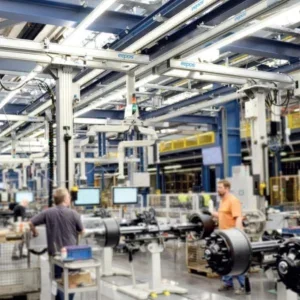According to Mick Batty, managing director of Certex UK, most companies buy their lifting gear close to home. Certex supplies lifting gear in 22 countries. It is part of the £460m ($690m) Lifting Products Division of the £1.8bn ($2.7bn) engineering conglomerate FKI, along with such well known industry names as Bridon, Parsons and Crosby.
Batty oversees the UK arm of the Certex Group and even though he works for a multinational corporation, he understands that buying decisions are made at a local level.
“I live in Doncaster in South Yorkshire. I’ve worked and travelled all over the world but I still wouldn’t venture over the hill to nearby Sheffield or Leeds to do my shopping,” he says. “Don’t ask me why, but I remain consistently loyal to the place where I live. It’s an attitude thing.”
It is this attitude that has formed the basis of the company’s newly-launched three-year expansion and reorganisation programme. At present Certex has 18 outlets, which it calls Lifting Centres, throughout the UK. Within the next two to three years this will rise to as many as 50. As competitors prepare to down-size and operate from single centralised locations, Certex is bucking the trend by planning to open these smaller, satellite Lifting Centres in key industrial locations.
Whatever the brand – be it Bridon, Kuplex, Crosby, or Elephant – Certex’s research tells it that most customers still like to deal with a local, familiar face.
“We need to be out there where our customers can see us,” says Batty, whose first new-look Lifting Centre is to open shortly in Plymouth. “Although we are an international supplier and have some weighty global accounts it would be very naïve of us to assume that the most efficient way forward is to distance ourselves from our UK customers and operate via an anonymous call centre.”
Certex supplies and delivers across a wide range of industries from oil, manufacturing, energy, construction, marine and fishing, hardware, automotive, scrap materials and more.
“We could never survive by servicing all our customers from one location,” Batty adds. “Take our two specialised offshore units in Aberdeen and Great Yarmouth. The training and technical support developed at these sites specifically for our offshore customers operating worldwide is entirely different from that required by, say, a rural packaging company or a major manufacturer in the industrial heartlands of Birmingham. Every customer must be serviced differently, and while we intend to develop a standard corporate identity for each lifting centre – and with it standardised high service levels – each centre will inevitably maintain a degree of flexibility and individuality.”
Certex already provides training services for the lifting industry, but now plans to use its expanding network of sales outlets to offer specialised courses at a local level. It is also launching a software package, called Certman, for on-site management and certification of lifting equipment.
Hub concept
While the intent is to improve service by having a stronger local presence, costs can be reduced by centralising behind the scenes.
The UK Lifting Centres will be supported by three new depots, called Production, Service & Distribution Centres. These are in: Retford in Nottinghamshire; Wakefield in West Yorkshire; and Inverbervie in Scotland. Orders will be processed locally by the Lifting Centres, with high demand items kept in stock for customers calling in, but the majority of goods will be stored at, and distributed from, one of the three new depots. Batty describes these Service & Distribution Centres as “the hub of the wheel”.
Work has already begun at Wakefield and Retford. Maintenance and production machinery is being installed. The most costly investments are likely to be high rise storage systems and a newly-developed customised computer network linking the three Production & Distribution Centres with individual Lifting Centres, haulage contractors, salesmen and engineers. “Our sales force will carry palm-held devices to enable them to record and receive relevant data across the business,” explains sales director Charles Gillespie. This will enable staff to track the progress of orders. Inspection engineers, meanwhile, will use laptops to run on-the-job inspection reports directly into Certex’s Certman certification database.
In tandem with the development of the three hubs, procurement of transport services is switching from an ad-hoc local approach to a contract with two, maybe three, haulage companies to carry out a nationwide 24-hour delivery service from all three distribution sites.
Best of both worlds
The UK overhaul may well form the corporate model for other Certex divisions. Globally, the company has links with 130 Certex distribution outlets in America, Europe, the Middle East and Asia employing more than 1,500 people.
The rationale is that centralised depots will allow for centralised buying. Whereas in the past, individual Certex outlets have run almost as small, independent businesses responsible for their own purchasing, order taking and stock keeping, having the three depots will enable greater bulk buying of certain items.
“This has got to be to everyone’s benefit,” says Gillespie. “Increased buying power means wider choice for customers and better value for money.”
Centralised buying has already begun on selected lines. The company has, for example, secured exclusive rights to distribute the clamps of the Dutch manufacturer Inter-Product.
“You could say we are going for the best of both worlds,” says Gillespie. “To all intents and purposes we are continuing as locally-based suppliers and service engineers but with the potential added benefits of wider product choice and prompt delivery.”






